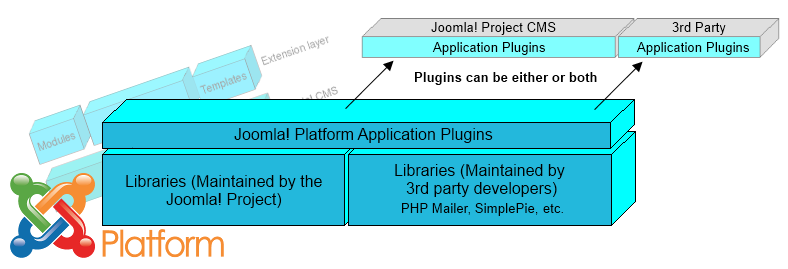Difference between revisions of "Platform"
From Joomla! Documentation
m (Adjusted layout) |
m (Cleaned up) |
||
| (5 intermediate revisions by 2 users not shown) | |||
| Line 1: | Line 1: | ||
<noinclude>{{chunk}}</noinclude>__NOTOC__ | <noinclude>{{chunk}}</noinclude>__NOTOC__ | ||
| − | + | <blockquote style="width:auto; border:1px solid grey; background-color:cornsilk; padding:5px; font-style:italic;">The Joomla Platform is a platform for writing Web and command line applications in PHP. It is free and open source software, distributed under the GNU General Public License version 2 or later. The Joomla Content Management System (CMS) is built on top of the Joomla Platform.<ref>https://github.com/joomla/joomla-platform</ref></blockquote> | |
| − | |||
| − | |||
| − | |||
| − | |||
| − | |||
| − | The Joomla! Platform | + | [[File:Architecture Joomla Platform.png|frame|400px|The Joomla! Platform]] |
| − | + | As of 24 April 2013, the Platform project has been retired. The Platform has been merged back into the [[CMS]], and the [[Framework]] has taken its place as the standalone application framework for Joomla! applications.<ref>[https://github.com/joomla/joomla-platform/blob/84014ad35b0d6294a43fcd2745aecb130849ed9e/CONTRIBUTING.markdown CONTRIBUTING.markdown]</ref><ref>https://groups.google.com/d/msg/joomla-dev-platform/zzNrsCUKCts/hsBntnONm9MJ</ref> | |
| − | |||
| − | |||
| + | The release of the Joomla Platform on 5 July 2011<ref>http://developer.joomla.org/code/cms/history/2010/12/02.html</ref> marked an important change in the Joomla! CMS architecture. The Joomla! CMS was initially a monolithic application. One of the aims of the Joomla! project was to separate the codebase into the CMS and an underlying library, which could then be reused for other projects. In version 1.5 and 1.6, that separation was prepared by creating a division between the [[Framework (CMS 1.5 and 1.6)]] ''(which is unrelated to the new [[Framework]] project)'' and the Joomla! [[CMS]] Application. The Joomla! Platform project continued this effort by separating that framework into an independent project (both in terms of code and organization). The Joomla! Platform is an independent set of libraries which do not depend on the Joomla! CMS Application. These libraries are made up of libraries maintained by the Joomla! Project and libraries maintained by other 3rd party developers. The Platform could be used for web and command-line applications entirely independent of and unrelated to the CMS. | ||
| + | The home of the Joomla! Platform was [https://github.com/joomla/joomla-platform the ''joomla/joomla-platform'' GitHub repository] that contains the source and documentation. The Platform stopped accepting contributions on or before 24 April 2013. | ||
<noinclude><references/></noinclude> | <noinclude><references/></noinclude> | ||
Latest revision as of 18:37, 14 June 2013
| Everything below this notice is a part or chunk of information which is used on multiple pages of this wiki. You can help the Joomla! Documentation Wiki by editing or contributing more to it if it is not protected from editing. Please leave <noinclude>{{chunk}}</noinclude> on the first line as it generates this notice. |
The Joomla Platform is a platform for writing Web and command line applications in PHP. It is free and open source software, distributed under the GNU General Public License version 2 or later. The Joomla Content Management System (CMS) is built on top of the Joomla Platform.[1]
As of 24 April 2013, the Platform project has been retired. The Platform has been merged back into the CMS, and the Framework has taken its place as the standalone application framework for Joomla! applications.[2][3]
The release of the Joomla Platform on 5 July 2011[4] marked an important change in the Joomla! CMS architecture. The Joomla! CMS was initially a monolithic application. One of the aims of the Joomla! project was to separate the codebase into the CMS and an underlying library, which could then be reused for other projects. In version 1.5 and 1.6, that separation was prepared by creating a division between the Framework (CMS 1.5 and 1.6) (which is unrelated to the new Framework project) and the Joomla! CMS Application. The Joomla! Platform project continued this effort by separating that framework into an independent project (both in terms of code and organization). The Joomla! Platform is an independent set of libraries which do not depend on the Joomla! CMS Application. These libraries are made up of libraries maintained by the Joomla! Project and libraries maintained by other 3rd party developers. The Platform could be used for web and command-line applications entirely independent of and unrelated to the CMS.
The home of the Joomla! Platform was the joomla/joomla-platform GitHub repository that contains the source and documentation. The Platform stopped accepting contributions on or before 24 April 2013.
